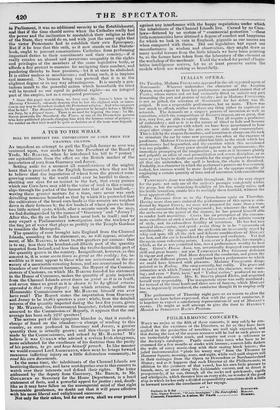A TUB TO THE WHALE.
BILL TO PROHIBIT THE IMPORTATION OF CORN FROM THE CHANNEL ISLANDS.
As impudent an attempt to gull the English farmer as ever was ventured upon, was made by the late President of the Board of Trade, Mr. BARING, when he introduced his bill to " protect " our agriculturists from the effect on the British market of the importation of corn from Guernsey and Jersey.
Setting aside for a moment all considerations of the mighty hoax that is practised on the English farmers, when they are led to believe that the importation of wheat from the greatest corn- growing country in the world could ever be hurtful to them,— shutting our eyes for an instant to the fact, that every guinea which our Corn-laws may add to the value of land in this country slips through the pocket of the farmer into that of the landlord,— waving these greater matters for a time, sure never was such drivelling nonsense broached as that by which it is pretended that the cultivators of the broad corn-lands in this country are weighed down in their fortunes by the few bushels of wheat grown in those two little retired spots, which, after a minute search on the map, we find distinguished by the names of' Guernsey" and "Jersey 1" After this, the fly on the bull's horn must look to itself; and we may expect a Parliamentary investigation into the tendency of the tiny jet of water that plays so prettily in the Temple Gardens to inundate the Metropolis.
The quantity of corn brought into England from the Channel Islands, according to the statement, or, as will appear, misstate- ment, of Mr. BARING, is about 16,000 quarters per annum : that is to say, less than the hundred-and-fiftieth part of the quantity imported from Ireland, and less than the twelve-hundredth part of the quantity grown in the country. Insignificant, however, as this amount is, it is some seven times as great as the reality; fur, in- credible as it may appear to those who are accustomed to the ac- curacy of a mercantile counting-house, and are accustomed to the blunders of our Government bureaus, the Report of the Commis- sioners of Customs, on which Mr. BARING founded his statement in the House of Commons, makes the quantity of grain imported from the Channel Islands seven times as great as it is in truth, and seven times as great as it is shown to be by qllicial returns appended to that very Report ; but which returns, neither the Honourable Commissioners nor Mr. BARING himself can ever have read! The Report states the importation from Guernsey and Jersey to be 16,065 quarters a year ; while, from the detailed returns of the quantity imported during the last five years, given by Mr. WESTON, the Government Inspector, (which returns are annexed to the Commissioners' Report), it appears that the real average has been only 2237 quarters! The serious part of this egregious blunder is, that it entails a charge of fraud on the islanders—a charge of sending to this country, as corn produced in Guernsey and Jersey, a greater quantity than is actually grown; and this charge is positively made by the Commissioners, and echoed by Mr. BARING! We believe it was CURRAN who advised a certain Irish clergyman, more celebrated for the excellence of his doctrine than the purity of his practice, to go and hear himself preach. In like manner we would counsel Lord Asnsuarost, when next he brings forward measures inflicting injury on a little defenceless community, to read his own documents.
In the mean time, the inhabitants of the Channel Islands are bestirring themselves, and have sent deputies over to this country to watch over their interests and defend their rights. The letter addressed by the deputy from Guernsey, Mr. BROCK, to Mr. GOULBIIRN as Secretary for the Home Department, is a lucid statement of facts, and a powerful appeal for justice : and, death- like as it may have fallen on the uncongenial mind of that right honourable gentleman, we doubt not that it will prove effective with his more liberal and enlightened successor.
Not only for their sakes, but for our own, shall we ever protest
against any interference with the happy regulations under which the inhabitants of the Channel Islands live. Cursed by no Corn- laws—fettered by no system of " commercial protection "--these little communities have attained a degree of comfort and happiness for which we look in vain in England, gigantic as our means are when compared with theirs. Did our legislators but equal our manufacturers in wisdom and observation, they might draw as many useful lessons from the little islands we have been pointing to, as the former have taken from the laboratory of the eheroist or the workshop of the mechanic. Until the wished-for period of legis- lative intelligence arrives, let us at least preserve entire the models which are working so beautifully.






















 Previous page
Previous page